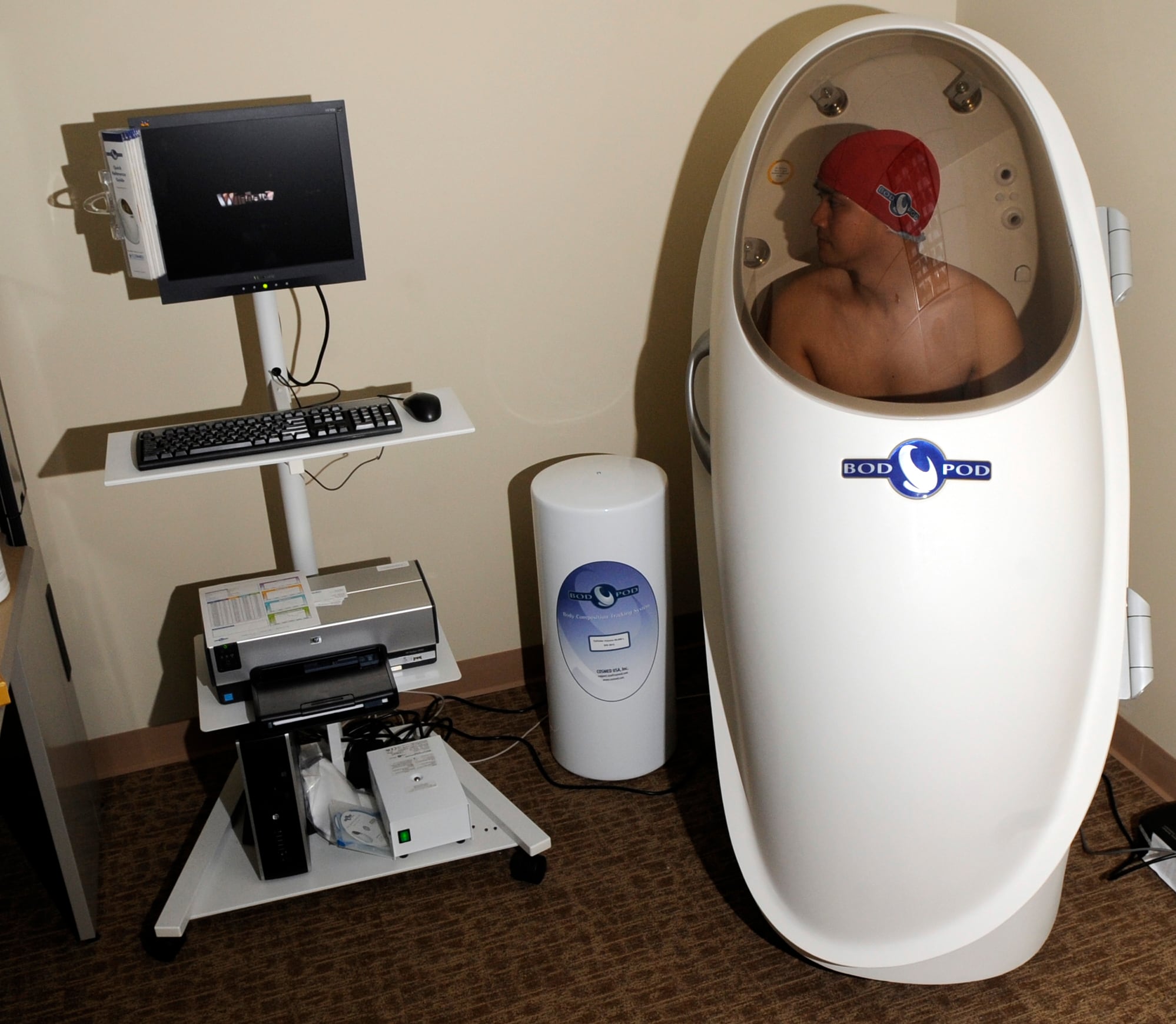Got a beef with the tape test? There may be some good news ahead.
The Marine Corps is conducting research that compares results of the much-maligned taping method to measure body fat with data from the Bod Pod — an expensive and high-tech fat-measuring method that gets highly accurate readings through air displacement.
The dual body fat measurements are just one element of a battery of tests administered to volunteers in the Ground Combat Element Integrated Task Force, now conducting training at Camp Lejeune, North Carolina. The coed task force was stood up last summer.
The roughly 650 Marines [[is that the right total? GH]]are is participating in infantry training designed to create gender-neutral standards for various combat tasks and refine existing training and readiness standards. In addition to field training and an upcoming "deployment" to the West Coast that will compare the success of all-male and integrated Marine units in accomplishing specific tasks, most volunteers are also undergoing athletic testing administered by University of Pittsburgh staff that documents everything from flexibility to the effects of past injuries and diet.
At the request of Marine Corps officials, the battery of 18 tests administered to volunteers in a special lab set up for the purpose includes two different fat measuring methods: the "tape test" ratio method currently administered to Marines who don't meet height and weight standards; and the Bod Pod, a trademarked system primarily used in the training of elite athletes.

Air Force Staff Sgt. George Solis uses a bod pod at Vandenberg Air Force Base, Calif. The egg-shaped chamber can determine troops' lean body mass.
Photo Credit: Air Force
While lab staff are just collecting all the information into a database at this point, the results of the two body fat tests will eventually be compared for each volunteer, said Megan Frame, a research associate facilitating the testing.
"The reason we're collecting both is just to have as many metrics as we can that are both field-friendly and laboratory-friendly," said Dr. Katelyn Allison, an assistant professor with the university's department of Sports Medicine and Nutrition and one of the school's project leads with the task force.
Marine Corps officials will ultimately decide whether they want to use the information, and how, she said.
"It's acknowledged that we're collecting both [methods] and it's acknowledged that this is something that needs to be addressed," Allison said. "This is something that's on the radar."
A spokeswoman for Headquarters Marine Corps headquarters, Capt. Maureen Krebs, said the service Marine Corps was not considering changing its body fat measuring method and added that the tape test was a Defense Department requirement, meaning any changes would have to begin there.
"We do want biometric data on individual volunteers to characterize the persons who correlate highly with successful military effects (and those who do not)," she said. "All the different biometric measurements and physical testing [the university UPitt is] doing, which includes the body composition tests, is data that will be compiled and correlated with military effects."
The call for new methods
With force-shaping and drawdown efforts still underway, the Marine Corps at this point has little motive to pursue a more accurate test in order to retain Marines who may be on the borderline. But some inside the Corps say rejecting the tape test is long overdue an idea whose time has come.
Last year, the Marine Corps separated 131 Marines who failed to meet fitness standards, according to data provided by Manpower and Reserve Affairs officials, out of the 1,144 assigned to the Body Composition Program. That's compared to 132 in fiscal year 2012 and 182 the year prior in fiscal 2011.
As ofIn 2013, about 14 percent 27,000 of the 194,000 Marines then on active duty had at one point or another required a tape test after failing to meet height and weight standards. If Marines don't meet body fat standards as measured by the tape — they must fall below 18 percent fat for men and 26 percent for women — they land in the BCP, where they'll spend much of their time focused on physical training and fitness.
Once placed on the BCP, Marines have six months to get back into standards, or they face separation from the Corps. The problem, say tape test detractors, is that the system is wildly inaccurate and can damage or end the careers of muscular, athletic Marines whose builds are more bulky.
Independent testing conducted by Military Times in 2013 showed margins of error varying from 12 to 66 percent when troops' tape test results were compared with results from the high-tech hydrostatic dunk tank method. In nine out of 10ten cases, the tape test yielded a higher body fat percentage.
Marine Sgt. Ryan Weisrock, a reconnaissance Marine and cCrossfFit competitor, told Marine Corps Times he hasd always needed the tape test, despite a lean-cut physique and well-defined abs.
At 5 feet '10 inches tall" and between 205 to and 215 pounds, Weisrock said he always had to be taped and [[already stated above]]sometimes required additional approval from battalion leadership when the tape test results showed he was out of regulation.
"Back at the battalion, whether I made tape or not, I'd go to the sergeant major and say, 'here's what I look like,'" Weisrock, who spoke to Marine Corps Times while on terminal leave, said. "And he'd say, 'OK, okay, you're in shape.'"

Marine Sgt. Ryan Weisrock, a CrossFit competitor and fitness enthusiast who has struggled to pass the tape test.
Photo Credit: Photo courtesy Ryan Weisrock
But while at a sergeant's course in Quantico, Virginia, Weisrock said he saw his career dreams evaporate when he tested out at 21 percent body fat and was informed he'd receive a negative fitness report.
To add insult to injury, he said, he was later tested at just 11 percent body fat by Quantico's Semper Fit staff, who used the caliper method.
"They gave me a piece of paper saying 'we recommend you do not lose any more weight,'" he said.
Now, said Weisrock, who is entering the Marine Reserve, said he now weighs 225 and just barely passes the tape test just under the wire at 18 percent — because he has a thicker neck, which alters the ratio calculation.
The tape test, he said, "is not accurate and never was."
For Staff Sgt. Jeff Smith, who went public in the pages of Marine Corps Times in 2013 with a one-man campaign to end the tape test, time and information are the greatest allies.
"What I'm saying about the tape test, maybe a decade ago it wasn't as well-known as it is today," he said. "The conversation used to be, 'it's accurate, there's nothing wrong with it.' Today, it's more like three out of 10ten [say that.] It's going to take culture to change it, and I think we're getting there."
An aircraft mechanic assigned to Marine Aviation Logistics Squadron 36 in Okinawa, Japan, Smith said his own career had been irreparably damaged after landing on the BCP in 2009, after a shoulder injury had led to some weight gain.
Though he initially planned to request mast and advertised his tape test protest on neon T-shirts during two-a-day workouts at the gym, Smith said he has since decided on a lower-key approach: sharing his perspective and experience in conversations with other Marines in his unit. He's also considering writing an article in the Marine Corps Gazette on the topic.
"I think things are coming around," he said. "It's not going to help me get promoted … but it will help other guys."




